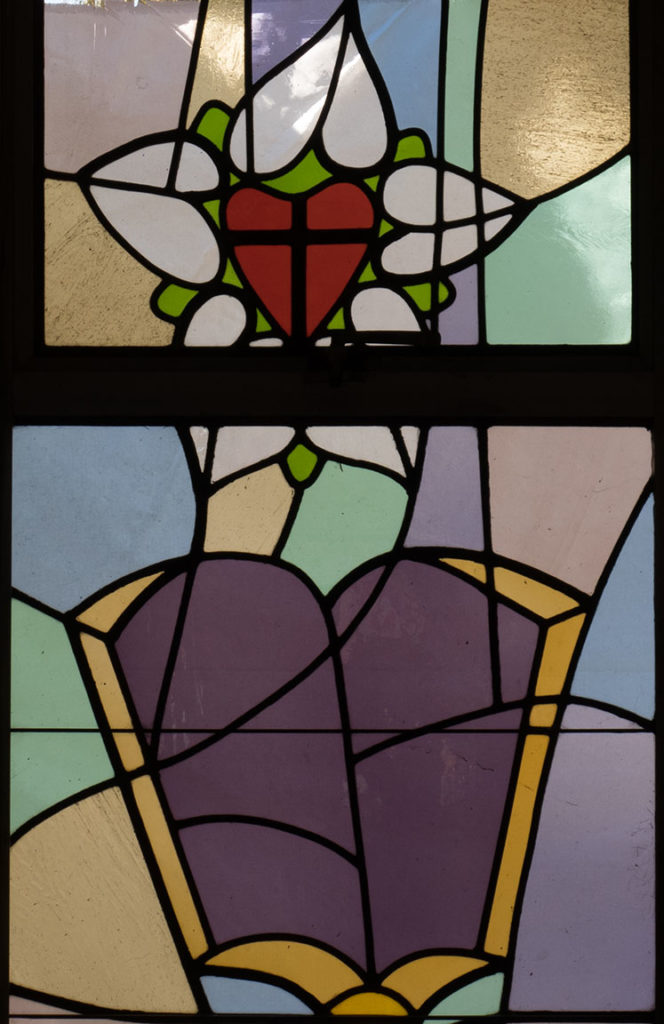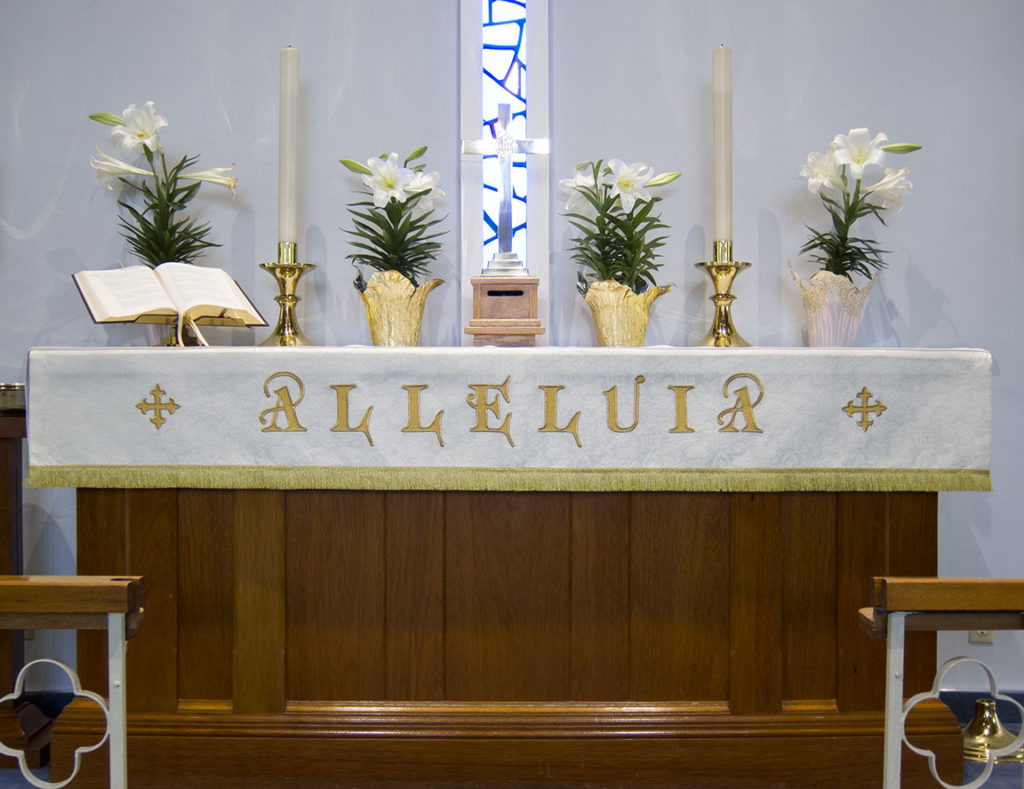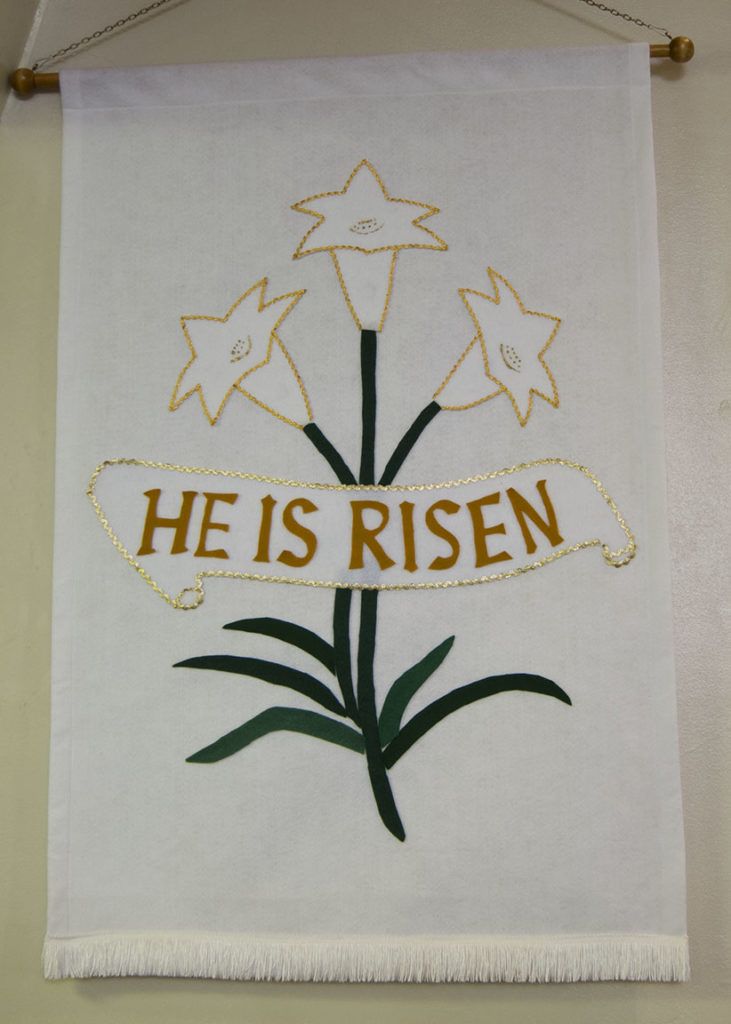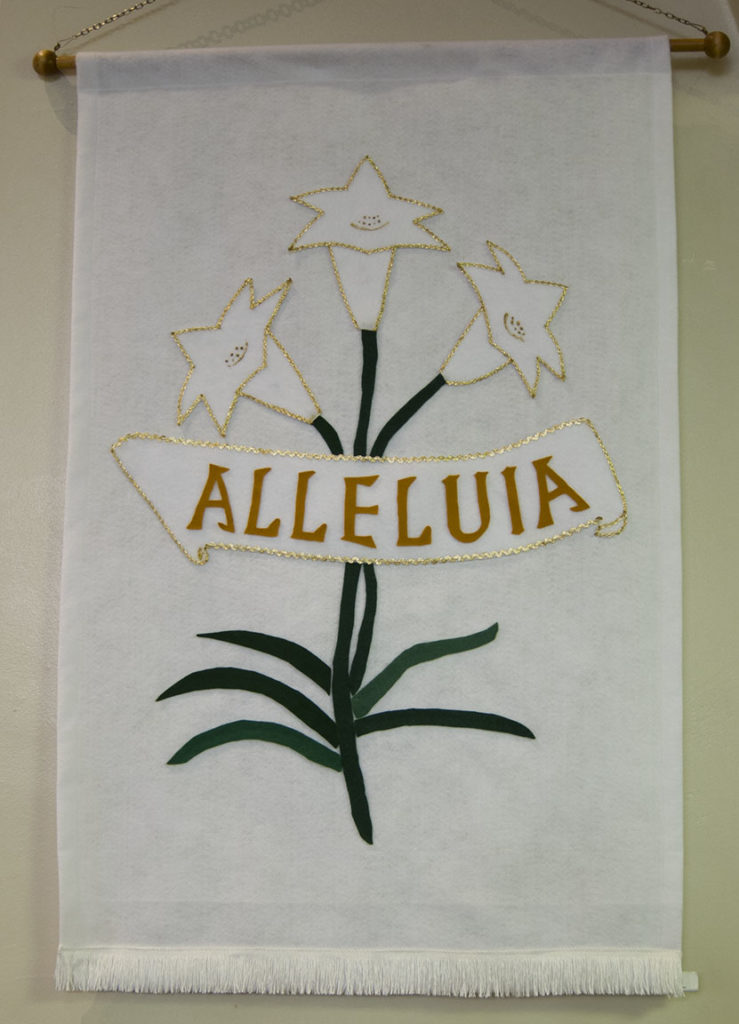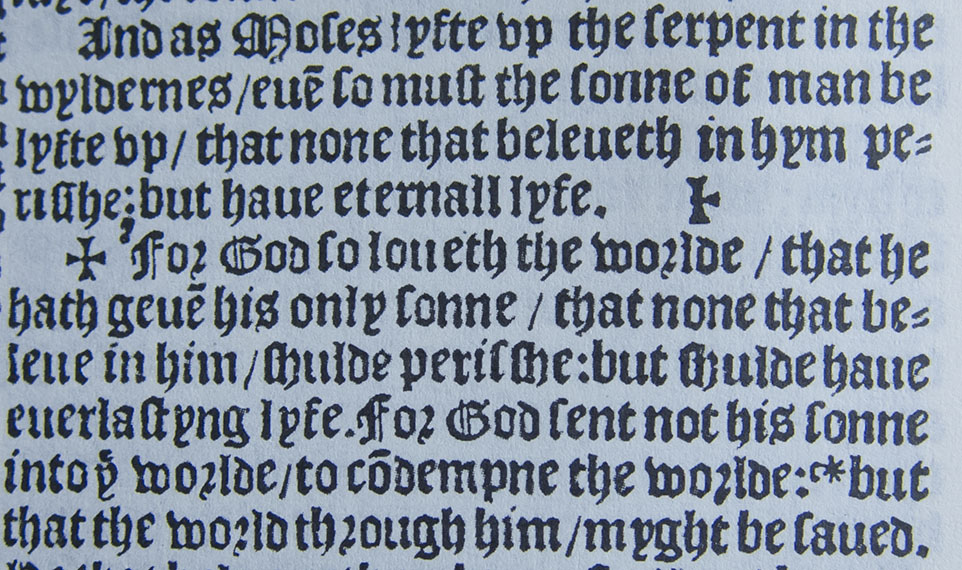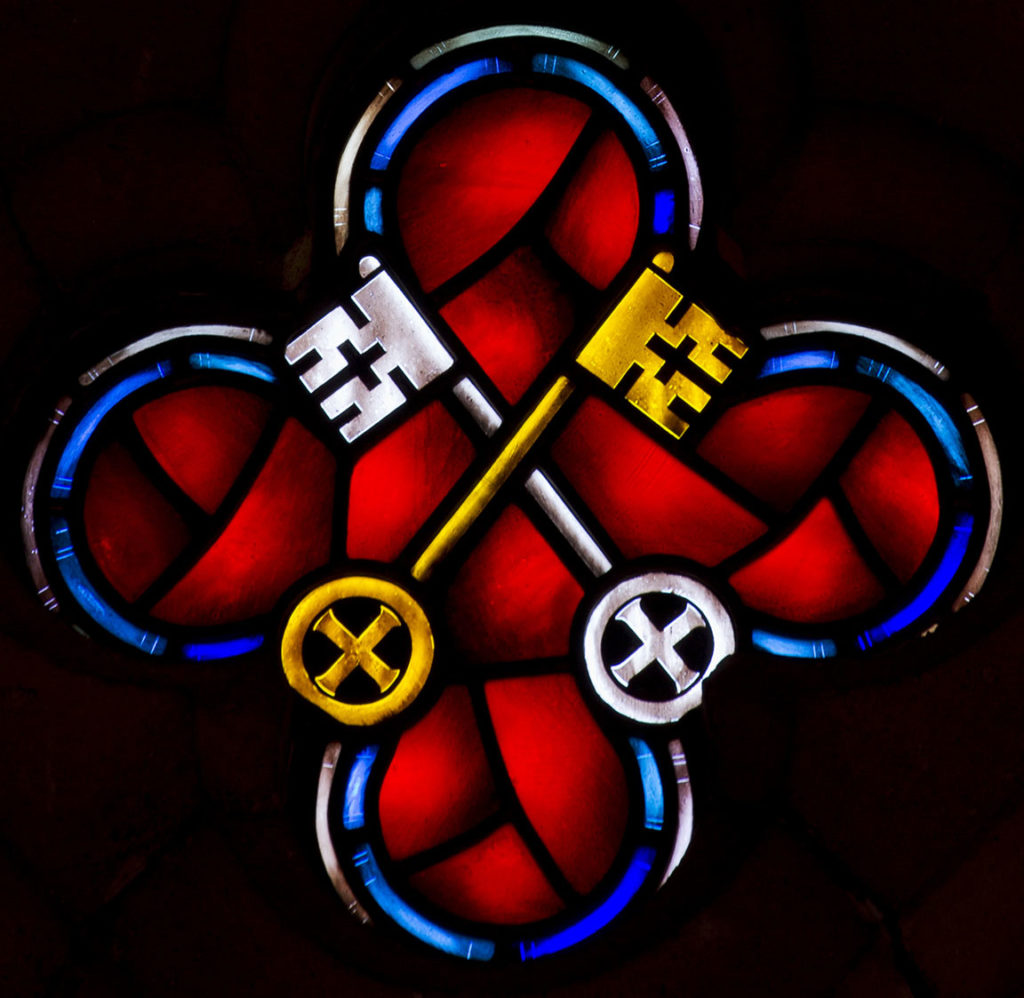Rev’d Mark B. Stirdivant, Good Shepherd Lutheran Church, Yucaipa, California
✝ sdg ✝

ixthus
My God eats fish! That sounds strange to you, doesn’t it? Today when you think of people talking about God, you’re thinking of deep, mysterious, and hidden truths, and in many people’s minds, God’s works are far superior to ordinary, earthly activities. In the Early Church times, there was a widely held heresy that made people think that the body actually held down the spirit and imprisoned it. Many people are enchanted with the thought that if you escaped your body you could then have direct contact with unseen spirits. Jim Jones convinced people to release their free spirits from the confines of their body, so they drank his poisonous cool-aid. There is something wrong with the body, but our human reason can’t bear to acknowledge its own sin. The body and the spirit, the visible and invisible, seem to be enemies in many people’s minds, and the human soul seems to long for something greater and higher than itself. Mankind is constantly attempting to approach God.
What do Christians today think is more spiritual? A prepared, written-out sermon, with a basis in a text of an ancient book? Or some helpful advice that you can find on the Internet? What prayer is better, one carefully crafted and printed in a book or one spoken on the spot and “from the heart?” Do we want a Savior up there in heaven, handing down principles to us to make our lives successful and more fulfilling, or one who takes up our poor, diseased and fallen flesh, dies, rises then eats some fish? I personally find it much harder to believe that what we have written down for us in the Bible is made up. It’s just not the kind of story that people usually tell. I mean, purely humanly speaking, why would God want to lower Himself to become a servant? The fact that He did is clear evidence that these events in the Scriptures really happened, and they are not made up, because mankind is always making spiritual talk about us rising up into heavenly realms, while God is concerned with coming down here to eat fish with sinners.
Here in the Gospel, these human “spiritualizing” notions are challenged – indeed, confronted head-on by our risen Savior as He miraculously stands before the frightened disciples. He stands there not spiritually, so that they have to close their eyes and feel Him in their hearts, but He stands in the very flesh which only days before had been crucified in bloody horror for the sin of the world. Christ is no fleeting specter or some shadowy “spirit-being.” He isn’t a disembodied Savior. But rather He’s the One who stands among us in His flesh and bone – especially is He here today in external means such as water, bread, wine, and words. His teachings haven’t come to us out of thin air, as it were, but rather through God’s human ministers, the servants of the Word and of His Church. God calls us not to a private, secret or spiritualistic Christianity, nor to merely changing our work ethics and morals, but He makes of us a living flesh and bone fellowship that receives a living flesh and bone Lord.
For weeks now, our Easter Gospels have found Jesus’ Disciples cowering in fear behind locked doors and windows – and for the third time, He appears to them speaking a Word of Divine peace. At first they were startled by His presence – even frightened by the thought that what they were seeing was a ghost. But hear what He says to them in order to put their troubled hearts at ease. “Look at My hands and My feet. Touch Me and see. A ghost does not have flesh and bones, as you see I have!” What a comfort this flesh and bone Savior desires to be for those who understand the dangers you daily face in life.
Where this tends to make the clearest difference is when our human struggle between life and death feels its sharpest sting. Right from the very beginning of life and from Baptism, the Christian faces death. Some reach a ripe, old age, others die far too soon. That’s why Baptism grants an abundant comfort to parents and ought to be a cause for joy for anyone who witnesses its ceremony. With simple water combined with His Word, God breaks into the darkness of death and sin and clothes us with the very same promise the Disciples received from Jesus on that first Easter evening.
Only those who are spiritually blind and foolish would refuse to seek such a concrete, tangible, flesh-and-bone Savior, for because of the sinful nature, they’re filled with such pride and arrogance that they think they have enough spiritual stuff inside themselves to manage on their own. But when trouble comes, and you find yourself standing before God stripped of everything and exposed, what you need is a real Savior’s real touch. When you’re buffeted by the storms of life, you need a steadfast Anchor to hold you steady – something outside yourself. And that Something, that Someone, is this same Lord who is pleased to come to us in ways that we can see, touch, and handle. That’s what was happening when Jesus appeared to His Disciples that night. He “showed them His hands and feet, and while they still didn’t believe it . . . He asked, ‘Do you have anything to eat?’ And when they gave Him a piece of broiled fish, He took it and ate it in their presence'” – so that they might see Him as a real flesh and blood Savior- God who eats fish and makes His followers into fishers!
Christ our Lord has given you a concrete promise to hold on to – a concrete hope upon which to build. He still provides you with a visible, tangible reassurance of His presence in this world today. In Holy Baptism, He applies His life to you through water and Word. In Holy Absolution, He personally grants you the forgiveness of sins in words spoken to you by your pastor. In Holy Communion, He gives you His body and blood to eat and drink as the real meal of salvation. Christ wants you to be confident that you have a Savior who’s still speaking to you the very same words of peace He first spoke to His disciples.
Contrast this faith with a so-called spiritual trust that looks only to your own heart for confidence and peace – and that ignores the real, saving touch of Jesus through flesh and blood! Aside from the outward promises of God, what else is there to cling to – private thoughts, feelings, personal opinions, or an independent religion in your heart that has no grounding in the Word of God? These things will consistently delude you and lead you astray. They won’t be there for you when you come face to face with the harsh reality of sin’s grasp on humankind – that death is waiting to claim your body someday!
But what God gives in the flesh of Christ, that will not betray you. You can count on His precious gift! That’s why God is here among His people to provide for them the saving body and blood of our Lord in bread and wine. As you eat that blessed Sacrament you have fellowship, oneness, with God through the very flesh and blood of His Only Begotten Son. That fellowship with God binds you together as one in the same confession of faith—the doctrine that upholds Christ’s Body, the Church universal which will never pass away.
John wrote in our Epistle last week: “We proclaim to you what we have seen and heard, so that you also may have fellowship with us. And our fellowship is with the Father – and with His Son, Jesus Christ.” Through our Flesh and Blood Savior, God has made you and me to be of one flesh – not only with Him as our God, but also with one another as brothers and sisters in Christ! Our Bridegroom is the Husband of only One Wife. And that Bride is us, His Church. We are bone of His bone and flesh of His flesh – and, since God called us by the Gospel, we now each belong one to the other.
When you and I eat the bread and drink the wine of the Holy Supper, God gives each of us the exact same food. There’s no difference in what we eat and drink in this Meal, for we are receiving it in common as members of God’s family in Christ. Thus it is a blessed Communion, and in it, we get all Jesus has – and all Jesus is. Jesus is here to make our hearts happy and bold, because we aren’t trusting in ourselves – or anything else we might have as individuals – but only in what we have in common, that is Jesus! If someone doesn’t believe and still eats this Supper, then it is harmful to them, so that is why we are called to be careful with the Lord’s Body and Blood.
Martin Luther once spoke of eating this gift of our flesh and blood Savior, saying: “When I eat it, then it eats me! Outwardly I eat the Meal, but inwardly and spiritually I receive all the treasures of Christ – and even Christ, Himself. So when I receive the Sacrament, it is Christ who receives, consumes, and devours both me and my sins, so that I enjoy and receive His righteousness, His godliness and His riches – as at the same time they swallow up my sin and misery.” (See What Luther Says, #2538)
In the very same way, as we are one in Jesus’ flesh, so we are also united together with one another. As individual grains of wheat are crushed, ground, baked and formed into a single loaf – as many grapes are squeezed and made into a single wine – so also we are gathered into one body in this Meal. As Christians, you and I don’t live our lives any longer in isolation from one another. In Christ your life has become my life, and my Faith has become your Faith. Our fellowship is not with God unless it’s also with one another! I, your pastor, serve you in my calling with all that I am and have, thus I become your food. And in turn, when you serve me and my family in love with all you are and have, then you become our meat and drink. We pray for you, and you kneel down before God’s throne of grace on our behalf as well.
We as the congregation of God are invested and completely consumed and lost in one another – and all because God the Father, in Christ, has made us to be of one family and one body. We all belong to one Christ – because whoever feasts upon the Savior has more to live on and live for than just himself. You have more than a private, secret, disembodied or merely spiritual Christianity to sustain you. We all have fellowship in real flesh and blood through Jesus Christ, your God who eats fish! – and in that fellowship we will live together forever with Him who has called us to be His very own.
In the Name of the Father and of the ✝ Son and of the Holy Spirit.

White Parament
Readings:
Acts 3:11–21 how the lame man was healed repent and turn back
Ps. 4 I will lie down in peace and sleep
1 John 3:1–7 Behold what manner of love the Father has bestowed on us … we shall be like Him
Luke 24:36–49 Jesus Himself stood among them…peace to you.
